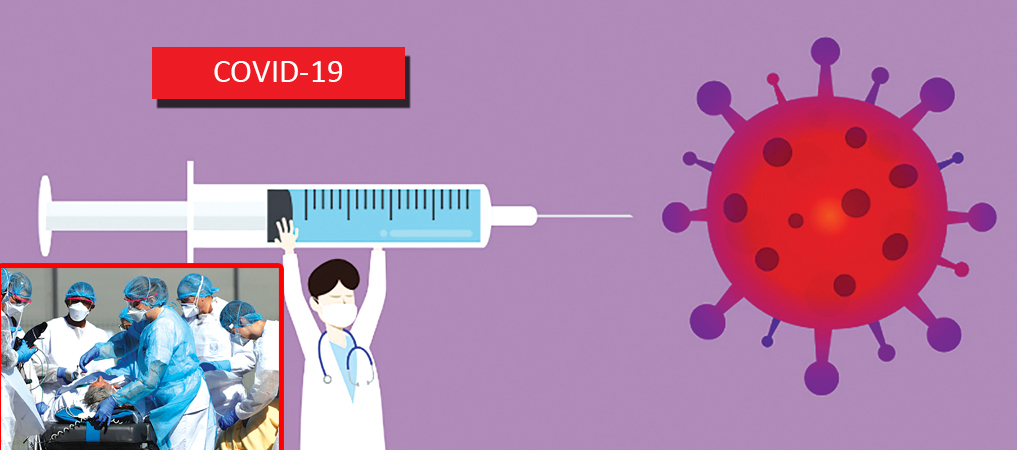Psychosocial Impact On Health Workers

Dr. Saswot K. Dhakal / Dr. Ujwol Neupane
The COVID-19 pandemic has affected the global population of all walks of life, with psychosocial health aspect being the most affected one.
Vulnerable
Health care providers are particularly vulnerable to emotional distress in the current pandemic, given the risk of exposure to the virus at their workplace, concern about infecting and caring for their family members, abysmal and conflicting decisions from higher authorities, shortages of personal protective equipment (PPE), and longer hectic work hours.
A specific and uncontrolled fear related to infection, pervasive anxiety, frustration and disabling loneliness has put up their mental resilience on an acid-test.
Previous studies have assessed the psychosocial impact of epidemics or pandemics such as SARS and found high levels of mental distress including panic attacks, and psychotic symptoms among healthcare workers. Evidence also shows that in addition to the stress of high numbers of people getting sick or dying, epidemics and pandemics also cause vast economic losses which are associated with further high psychosocial risk. Surely, the psychosocial impact on healthcare workers of a country like Nepal was too detrimental to not keep a light upon.
A study done on nurses of a tertiary care centre of Kaski district during the pandemic lockdown reported prevalence of depression, anxiety and stress among 39.5%, 50% and 25.7% of the respondents respectively.
Similarly, a nation-wide study confirmed some form of anxiety in 41.9% of respondents (borderline-23.6% and abnormal-18.3%); Nearly two-fifths (37.5%) had some form of depression (24 % borderline and 13.5% abnormal); among health workers, 26.7% had subthreshold insomnia, 5.7% had moderate clinical insomnia and 1.5% had severe clinical insomnia; Nearly half of the participants (46.1%) expressed high degree of COVID related fear such that the proportion of high degree of COVID related fear was 63.5% among nurses, 39.7% among other health workers and 34% among doctors.
Also, the very same study showed that nearly half of the health workers (49.1%) were working overtime, only 21.1% of health workers said that precautionary measures in their workplace were sufficient, clearly demonstrating overexploitation of health worker during the pandemic.
Also, more than half of health workers (53.7%) mentioned that they faced stigma due to COVID-19. One-fourth of health workers (26.7%) said they were stigmatized because of their profession, 21.5% accused of being a carrier, 3.2% threatened and 2.3% asked to leave a rented place. Nurses had a higher chance of having anxiety, and COVID related to fear as compared to other health professions. Inadequate precautionary measures in the workplace were associated with higher odds of having anxiety and depression as compared to those who had adequate precautionary measures.
COVID related fear was positively significant among health workers working in the affected district as compared to those working in the non-affected district. Presence of a family member with chronic disease was significantly associated with the presence of COVID-19 related fear.
Comparing these figures to that in other countries such that in China, who faced bigger challenges as their health care facilities were overwhelmed with COVID-19 patients requiring hospitalisation and intensive care, the prevalence of anxiety, depression and insomnia was found to be quite high (44.6%, 50.4% and 34.0% of health workers were reported to have anxiety, depression and insomnia respectively).
Stressful Environment
The increased risk of infection and stressful environment might have contributed to higher mental health impacts among health workers in China than in Nepal.
Even under normal circumstances, good mental health is crucial to the functioning of society. During a pandemic, however, it can affect how we respond and recover. Health-care workers are essential to the COVID-19 response but may have to leave the workforce if their mental health is not protected.
On May 13, 2020, the World Health Organization issued a report on the "Need for Action on Mental Health" which states "the frontline healthcare workers and first responders are exposed to numerous stresses". The nation's overall health system will surely collapse if doctors, nurses and frontline responders start getting infected with the virus and head into isolation, further weakening the chances of returning to a normal state. Therefore, it is only logical that they should be protected at any cost and their mental health given top priority.
However dark the tunnel might be, there has to be a light at the end of it. Recent news of the development of COVID-19 vaccines working at above 90% efficacies has provided a much-needed relief among the general population, more profoundly among health care workers.
Surely, the administration of vaccine will provide appropriate armour to deal with coronavirus in the long run, however, the country must be prepared for numerous mental health threats associated with the pandemic and precautionary activities should be integrated into general pandemic health care system.
(Dhakal and Neupane are medical practitioners)
Recent News

Do not make expressions casting dout on election: EC
14 Apr, 2022
CM Bhatta says may New Year 2079 BS inspire positive thinking
14 Apr, 2022
Three new cases, 44 recoveries in 24 hours
14 Apr, 2022
689 climbers of 84 teams so far acquire permits for climbing various peaks this spring season
14 Apr, 2022
How the rising cost of living crisis is impacting Nepal
14 Apr, 2022
US military confirms an interstellar meteor collided with Earth
14 Apr, 2022
Valneva Covid vaccine approved for use in UK
14 Apr, 2022
Chair Prachanda highlights need of unity among Maoist, Communist forces
14 Apr, 2022
Ranbir Kapoor and Alia Bhatt: Bollywood toasts star couple on wedding
14 Apr, 2022
President Bhandari confers decorations (Photo Feature)
14 Apr, 2022










